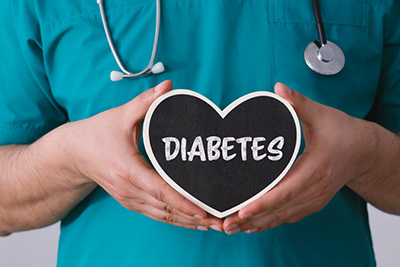
“A healthy diet, regular physical activity, maintaining a normal body weight, and avoiding tobacco use are ways to prevent or delay the onset of type 2 diabetes.” - World Health Organization
According to WHO, The number of people with diabetes rose from 108 million in 1980 to 422 million in 2014. Prevalence has been rising more rapidly in low- and middle-income countries than in high-income countries.
Diabetes is a chronic condition that arises when the pancreas does not make enough insulin or the body does not use the insulin produced in sufficient quantities.
Insulin is a hormone that controls blood sugar levels. Hyperglycemia, or high blood sugar, is a typical side effect of uncontrolled diabetes and can cause devastating damage to many body systems, especially neurons and blood vessels, over time.
If left untreated, diabetes can lead to kidney, heart, and blindness. Untreated high blood sugar from diabetes can damage your nerves, eyes, and other organs.
Type 1 diabetes is the most severe form of diabetes and is caused by a lack of insulin in the body. It is an autoimmune disease, which means your body is attacking itself. That’s why it is also called insulin-dependent diabetes.
Type 2 diabetes is the most common type of diabetes. It is caused by a lack of insulin in the body. This type occurs when your body does not produce enough insulin. It usually occurs in middle-aged and older people.
Medication can control both types of diabetes, but there is no cure for type 2 diabetes.
This type is the stage before type 2 diabetes. Your blood glucose level is higher than normal, but not high enough to be diagnosed with type 2 diabetes.
Most women with gestational diabetes have no symptoms. This problem is often diagnosed through a standard blood sugar test or an oral glucose tolerance test, which is usually done between the 24th and 28th week of pregnancy. A woman with gestational diabetes may experience increased thirst or urination rarely. Gestational diabetes usually goes away after pregnancy.
Type 1 diabetes is more common among youngsters and teenagers, those who have a parent or sibling who is affected by the condition, and people who have particular genes connected to the condition.
You are more likely to develop type 2 diabetes if you are overweight, 45 or older, have a parent or sibling who is affected with diabetes, are not physically active, have had gestational diabetes, have prediabetes, and have high blood pressure, and high cholesterol.
You are more likely to develop gestational diabetes if you have had gestational diabetes in the past, are overweight, have a family history, are over the age of 25, have given birth to a baby weighing more than 9 pounds, or of type 2 diabetes.
Ask your medical team. They might have a clear target area for you. But generally, most people aim to maintain these targets for their blood glucose levels:
Hypoglycemia is defined as a blood glucose level that is lower than the normal range (usually less than 70 mg/dL). This is a signal from your body that you require sugar.
Symptoms of hypoglycemia:
Hyperglycemia occurs when there is an excess of glucose in the blood.
If you are at risk of diabetes, diabetes can be avoided or prevented. The majority of what you need to do involves living a better lifestyle. If you make these modifications, you will reap additional health benefits. You may reduce your risk of developing other ailments, and you will most likely feel better and have more energy. The modifications are as follows:
Diabetes prevention begins with weight management. By losing 5 to 10% of your current weight, you may be able to avoid or delay diabetes. And once you lose weight, you must never gain it again.
Tobacco use can increase insulin resistance, which can lead to type 2 diabetes. If you already smoke, try to quit.
Regular physical activity has lots of advantages. By doing regular exercise, you can reduce your blood sugar, lose extra weight, and Increase your insulin sensitivity, which aids in keeping your blood sugar within a reasonable level. You should aim for 30 minutes of aerobic exercise daily. You can do cardiovascular exercise on most days, for at least 150 minutes per week, such as brisk walking, swimming, bicycling, or running.
Eat a variety of foods from each food group, including whole wheat, veggies, and fruits, and avoid red meat. It is essential to reduce the number of calories you consume each day to lose weight and keep it off. To accomplish this, you should eat smaller portions and consume less fat and sugar.
Yes, undiagnosed and uncontrolled diabetes (severely high or severely low glucose levels) can cause devastating damage to your body. Diabetes can result in heart attack, heart failure, stroke, kidney failure, or coma. These complications have the potential to kill you. Heart disease, in particular, is the leading cause of death in adults with diabetes.
If you're at risk for diabetes or experiencing symptoms like increased thirst, frequent urination, unexplained weight changes, or fatigue, it's important to get screened as soon as possible. At Suburban Medical Group, we provide comprehensive diabetes screening and personalized care plans to help manage and prevent complications.
Our dedicated providers in Bolingbrook and Carol Stream offer expert guidance on blood sugar monitoring, lifestyle modifications, and medical treatments tailored to your needs. Whether you need an initial screening or ongoing diabetes management, we’re here to support your health journey.
Take control of your health today - schedule an appointment at one of our convenient locations.